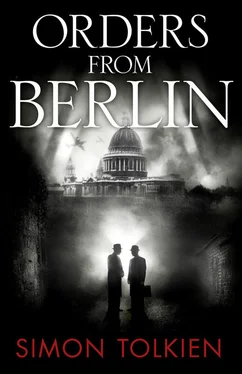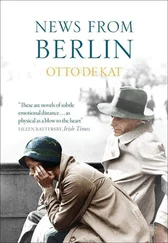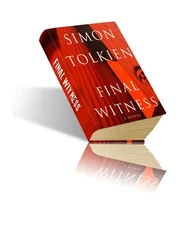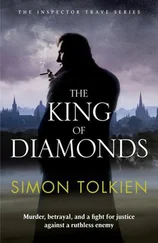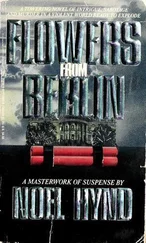Simon Tolkien - Orders from Berlin
Здесь есть возможность читать онлайн «Simon Tolkien - Orders from Berlin» — ознакомительный отрывок электронной книги совершенно бесплатно, а после прочтения отрывка купить полную версию. В некоторых случаях можно слушать аудио, скачать через торрент в формате fb2 и присутствует краткое содержание. Жанр: Полицейский детектив, на английском языке. Описание произведения, (предисловие) а так же отзывы посетителей доступны на портале библиотеки ЛибКат.
- Название:Orders from Berlin
- Автор:
- Жанр:
- Год:неизвестен
- ISBN:нет данных
- Рейтинг книги:4 / 5. Голосов: 1
-
Избранное:Добавить в избранное
- Отзывы:
-
Ваша оценка:
- 80
- 1
- 2
- 3
- 4
- 5
Orders from Berlin: краткое содержание, описание и аннотация
Предлагаем к чтению аннотацию, описание, краткое содержание или предисловие (зависит от того, что написал сам автор книги «Orders from Berlin»). Если вы не нашли необходимую информацию о книге — напишите в комментариях, мы постараемся отыскать её.
Orders from Berlin — читать онлайн ознакомительный отрывок
Ниже представлен текст книги, разбитый по страницам. Система сохранения места последней прочитанной страницы, позволяет с удобством читать онлайн бесплатно книгу «Orders from Berlin», без необходимости каждый раз заново искать на чём Вы остановились. Поставьте закладку, и сможете в любой момент перейти на страницу, на которой закончили чтение.
Интервал:
Закладка:
‘Don’t be ridiculous. I did no such thing. Albert left us both his money because we’re married. What’s mine is yours and what’s yours is mine. You know that.’
‘Which would be fine, except that you’ve got nothing — nothing except my father’s money and a mountain of debts. Pretty convenient he died when he did, isn’t it?’
There! She’d said it. It was as though she and Bertram could pretend that the suspicion wasn’t there as long as she didn’t voice it, but once the accusation had been spoken, she knew she couldn’t take it back. It was between them now, opening up like a chasm that neither of them could bridge.
‘I had nothing to do with your father’s death,’ said Bertram, speaking slowly, almost as if he were taking an oath in a court of law. ‘How could you even think such a thing, Ava?’
‘I don’t know. I don’t know what to think,’ said Ava, suppressing a cry and putting her hands over her face so she wouldn’t have to see her husband, wouldn’t have to deal with him or even think about him. She couldn’t bring herself to believe that he’d killed her father. He might have a motive, but she felt he was too weak, too law-abiding, to be capable of such an act. Her cry was more a scream of frustration because she wanted to escape from her thoughts but couldn’t. The flat was too small and there was nowhere else to go, nowhere to run away to, except out into the cold, friendless streets, windswept and full of rain.
She ran blindly into the bedroom and shut and locked the door. Her hands were wet, soaked with tears that she hadn’t felt as they’d streamed down, emptying her of emotion. She lay face down on the brown satin eiderdown, buried her head in the lumpy pillow, and fell asleep, then woke up in the small hours ravenously hungry.
She unlocked the door and found Bertram asleep on the sofa in the sitting room, curled up under a blanket in the foetal position. He’d undressed to his underwear, and she noticed how he’d folded his clothes carefully and left them on a chair, with his bow tie sitting ridiculously on top. She watched him for a moment in the half-light, listening to his snoring, unable to understand how she could be married to this stranger with whom she had so little in common. Nothing in her life made sense to her any more; nothing added up.
Shaking her head, she turned away and went into the kitchen and spread a thin layer of jam across the crust of a half-stale national loaf she’d bought at the bakery the day before. There was nothing else left in the pantry. She ate standing up, listening to the rain beating on the roof and running down in torrents from the guttering outside the blacked-out window. In all her life, she’d never felt more alone.
They drove to the funeral, following the horse-drawn hearse as it made its way slowly across the river. As a doctor, Bertram was entitled to use a car, but he rarely availed himself of the privilege, and Ava was surprised that he hadn’t sold his Austin 7 to help pay his debts. Now, of course, that wouldn’t be necessary.
Ava felt as if she were riding through a ghost town. The incessant rain was only now beginning to ease and the streets were deserted. She glanced over at her husband, watching the careful, over-precise way he held the steering wheel and manoeuvred the gear stick up and down in his leather-gloved hand. It struck her that he was the most repressed person she’d ever met. How ironic, she thought, that a woman who so yearned for life and love should have tied herself to a man so utterly unable to provide her with either.
It was a half-world she was living in. It always had been. She’d lived her life on other people’s terms, never her own. When she looked in the mirror, she saw Albert Morrison’s daughter or Bertram Brive’s wife, never Ava. Yet she knew it didn’t have to be this way. The country was crying out for women to join the Wrens, to work on the land or in the munitions factories. Every time she went out, posters of beautiful female warriors in tin hats and starched khaki uniforms beckoned to her from the sides of buses or the walls of the underground, their far-seeing eyes gazing into a brave future. Yet up to now she’d done nothing to heed their call. She’d stayed at home, inert and isolated amid the turmoil.
And it wasn’t just the war she was missing. There was the music too. She listened to it on the radio when Bertram wasn’t there. Jazz and swing; Charleston and tango — infectious rhythms that made her want to kick off her shoes and dance. And sometimes she did, letting go for a moment as she spun around amongst the dreary furniture with her light brown hair thrown up in a whirl about her head.
On weekend afternoons, she’d seen the shop girls coming out of the Empire ballroom on the King’s Road — starry-eyed, flushed, and laughing. Why couldn’t she have that too? Life was passing her by, leaving her behind. She glanced over at her husband and felt crushed by the weight of him, as though she couldn’t breathe. She wound down the window and leant her head out of the car into the cold air. She could hear Bertram objecting, shouting at her to stop, but she ignored him. The bite of the wind on her face made her feel alive, separate from her dead father, laid out on his back inside his pale brown wooden coffin, bumping along the potholed road in the back of the hearse up ahead.
A throng of people all dressed in black was milling around on the pavement, but for a moment she was alone. Bertram was bustling about, shaking hands; clearing a path for the pallbearers to bring the coffin into the church; talking to the vicar, whose cassock kept blowing up incongruously in the wind, revealing a pair of long black socks that he was wearing underneath. Neither she nor Bertram was a churchgoer, yet Bertram seemed to be treating the vicar like an old friend. He was clearly enjoying himself. Ava knew there was nothing Bertram liked more than organizing people. He’d missed his vocation, she thought. He’d have made a far better funeral director than a doctor. She turned away, biting her lip to contain her irritation. Everything about her husband seemed to grate on her these days.
She looked around, scanning the faces of the mourners. There were some she recognized — Mrs Graves and several other neighbours from Gloucester Mansions, her father’s solicitor, and a cousin of her mother’s — but many of them were new to her. She wondered who they were. Old work colleagues of her father’s, she assumed, come to pay their last respects. It hurt her to realize how little she’d known him and how much he’d kept from her. She’d been aware for as long as she could remember that her father worked in the City. Every day he would leave the house in his pinstripe suit and bowler hat, carrying a briefcase with a brass lock, and a black umbrella in wintertime, and every evening he would return, although sometimes late, when she had already gone to bed and would be lying awake in the dark, listening for the sound of his key in the door.
Ava knew that men who worked in the City did things with money, so she had naturally always assumed that her father was a businessman of some kind. And as she knew nothing about finance, she’d never asked him about his work and he had never volunteered any information. And so it had gone on year after year, until the day he died.
But now Ava regretted her lack of curiosity. She wished she’d asked him questions, although she suspected that he wouldn’t have answered them even if she had. Their lack of connection had been a two-way street.
She thought of the still-uncleared flat in Gloucester Mansions and all her father’s books piled up in tottering towers around his desk. She realized with a jolt that she’d never really considered the titles on the spines. She’d thought of them more as objects, physical barriers that he put up to protect his privacy. But she remembered enough to know that most of them were about politics and history and subjects like that; hardly any of them were about money. The books were too many to be a hobby. She realized now that they were a clue to who her father was — someone more interesting than a stockbroker; a diplomat, perhaps, except that he rarely travelled; or someone who worked for the government in some secret capacity that couldn’t be discussed. Maybe there had been an official reason for her father’s silence, an explanation beyond his natural reticence. She’d have preferred that. It would make the failure of their relationship a little easier to bear.
Читать дальшеИнтервал:
Закладка:
Похожие книги на «Orders from Berlin»
Представляем Вашему вниманию похожие книги на «Orders from Berlin» списком для выбора. Мы отобрали схожую по названию и смыслу литературу в надежде предоставить читателям больше вариантов отыскать новые, интересные, ещё непрочитанные произведения.
Обсуждение, отзывы о книге «Orders from Berlin» и просто собственные мнения читателей. Оставьте ваши комментарии, напишите, что Вы думаете о произведении, его смысле или главных героях. Укажите что конкретно понравилось, а что нет, и почему Вы так считаете.
